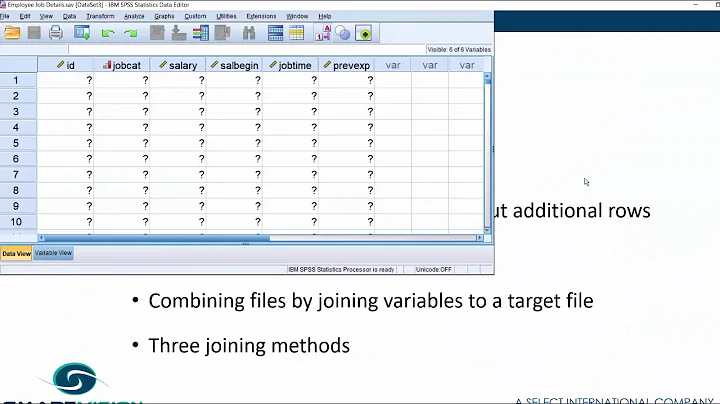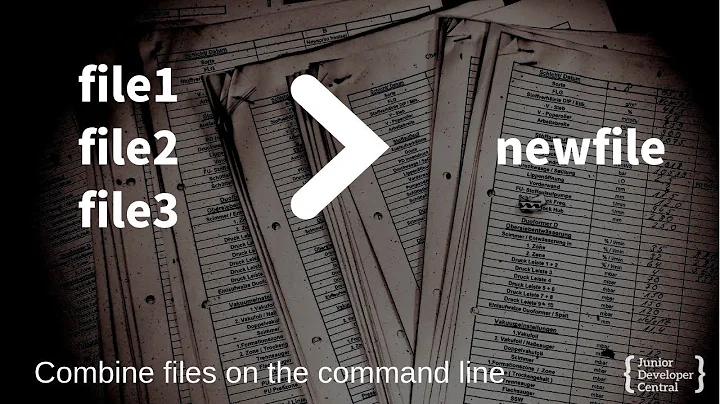How can I merge files on a line by line basis?
Solution 1
The right tool for this job is probably paste
paste -d '' file1 file2
See man paste for details.
You could also use the pr command:
pr -TmJS"" file1 file2
where
-
-Tturns off pagination -
-mJmerge files, Joining full lines -
-S""separate the columns with an empty string
If you really wanted to do it using pure bash shell (not recommended), then this is what I'd suggest:
while IFS= read -u3 -r a && IFS= read -u4 -r b; do
printf '%s%s\n' "$a" "$b"
done 3<file1 4<file2
(Only including this because the subject came up in comments to another proposed pure-bash solution.)
Solution 2
Through awk way:
awk '{getline x<"file2"; print $0x}' file1
-
getline x<"file2"reads the entire line from file2 and holds into x variable. -
print $0xprints the whole line from file1 by using$0thenxwhich is the saved line of file2.
Solution 3
paste is the way to go. If you want to check some other methods, here is a python solution:
#!/usr/bin/env python2
import itertools
with open('/path/to/file1') as f1, open('/path/to/file2') as f2:
lines = itertools.izip_longest(f1, f2)
for a, b in lines:
if a and b:
print a.rstrip() + b.rstrip()
else:
if a:
print a.rstrip()
else:
print b.rstrip()
If you have few number of lines:
#!/usr/bin/env python2
with open('/path/to/file1') as f1, open('/path/to/file2') as f2:
print '\n'.join((a.rstrip() + b.rstrip() for a, b in zip(f1, f2)))
Note that for unequal number of lines, this one will end at the last line of the file that ends first.
Solution 4
Also, with pure bash (notice that this will totally ignore empty lines):
#!/bin/bash
IFS=$'\n' GLOBIGNORE='*'
f1=($(< file1))
f2=($(< file2))
i=0
while [ "${f1[${i}]}" ] && [ "${f2[${i}]}" ]
do
echo "${f1[${i}]}${f2[${i}]}" >> out
((i++))
done
while [ "${f1[${i}]}" ]
do
echo "${f1[${i}]}" >> out
((i++))
done
while [ "${f2[${i}]}" ]
do
echo "${f2[${i}]}" >> out
((i++))
done
Solution 5
The perl way, easy to understand:
#!/usr/bin/perl
$filename1=$ARGV[0];
$filename2=$ARGV[1];
open(my $fh1, "<", $filename1) or die "cannot open < $filename1: $!";
open(my $fh2, "<", $filename2) or die "cannot open < $filename2: $!";
my @array1;
my @array2;
while (my $line = <$fh1>) {
chomp $line;
push @array1, $line;
}
while (my $line = <$fh2>) {
chomp $line;
push @array2, $line;
}
for my $i (0 .. $#array1) {
print @array1[$i].@array2[$i]."\n";
}
Start with:
./merge file1 file2
Output:
foobar
icecream
twohundred
Related videos on Youtube
Comments
-
 TuxForLife over 1 year
TuxForLife over 1 yearcat file1
foo ice twocat file2
bar cream hundredDesired output:
foobar icecream twohundredfile1 and file2 will always have the same amount of lines in my scenario, in case that makes things easier.
-
 TuxForLife about 9 yearsAwesome, thank you for the very simple solution. Should I ever worry about portability when it comes to using paste?
TuxForLife about 9 yearsAwesome, thank you for the very simple solution. Should I ever worry about portability when it comes to using paste? -
nettux about 9 years@user264974 paste is in GNU Coreutils so you're probably fairly safe.
-
geirha about 9 yearsThis is just plain wrong. It doesn't work at all. Either use
mapfileto read the files into arrays, or use a while loop with tworeadcommands, reading from each their fd. -
 kos about 9 years@geirha You're right, I messed up with the syntax, it's ok now.
kos about 9 years@geirha You're right, I messed up with the syntax, it's ok now. -
geirha about 9 yearsnot quite. With the updated code, empty lines will be ignored, and if any line contains glob characters, the line might be replaced with matching filenames. So never use
array=( $(cmd) )orarray=( $var ). Usemapfileinstead. -
 kos about 9 years@geirha You're right of course, I took care of the glob characters but I left the newline ignored, because in order to do that and in order to make a decent solution out of it it needs to be rewritten. I specified this and 'll leave this version in case it's going to be useful to somebody in the meantime. Thanks for your points so far.
kos about 9 years@geirha You're right of course, I took care of the glob characters but I left the newline ignored, because in order to do that and in order to make a decent solution out of it it needs to be rewritten. I specified this and 'll leave this version in case it's going to be useful to somebody in the meantime. Thanks for your points so far.





